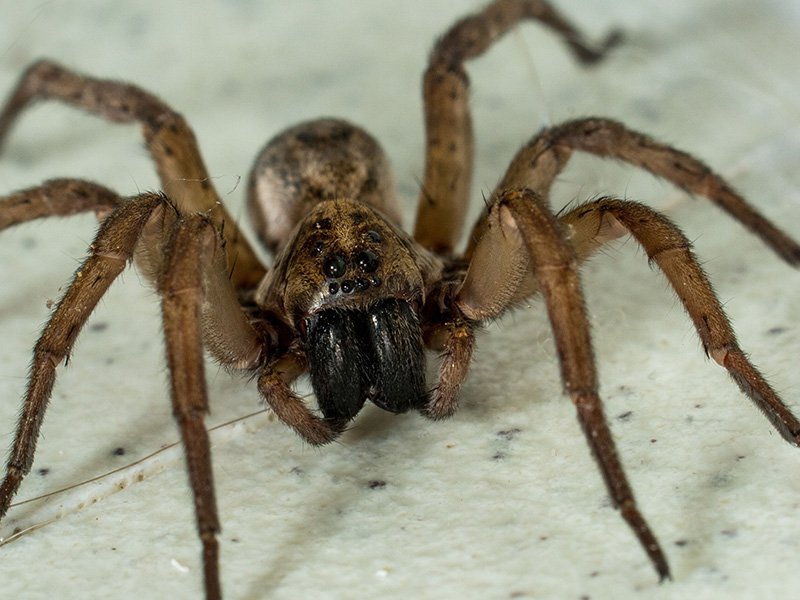Common Spider Species in the North Atlanta Metro
While many spider species live in the Metro Atlanta area, only a few commonly enter homes. The most frequent indoor spiders are house spiders and wolf spiders, though venomous brown recluse and black widow spiders may also appear.
House Spiders
- Small, tan-brown with long, thin legs
- Often found in ceiling corners or humid rooms
- Build messy webs and frequently abandon them for new ones
Wolf Spiders
- Large, hairy, and fast-moving (can startle people)
- Hunt for prey instead of building webs
Brown Recluses
- Brown with a darker violin-shaped marking on the back
- Bites can cause tissue damage; medical attention is required
Black Widows
- Shiny black with a red hourglass on the abdomen
- Bite causes pain, muscle cramps, nausea, and breathing difficulty; medical attention is required
Why Spiders Move Indoors in the Fall
There are several reasons spiders move indoors in the fall. Spiders seek warmer shelter as temperatures drop, and homes offer a climate-controlled environment that stays comfortable year-round.
Spiders also follow their food sources. Insect activity decreases outside during the fall, but many insects move indoors to survive the winter. Spiders will often follow, taking advantage of a steady food supply inside.
Humidity changes can also drive spiders indoors. Spiders may look for a more suitable environment if it becomes too dry or too wet outside. Because most spiders prefer some level of moisture, they’re often found in basements, bathrooms, or other areas where humidity is higher.
Common Entry Points and Hiding Spots
Spiders are small, so they don’t need a large opening to get inside. Common entry points include:
- Gaps around windows and doors
- Holes in screens
- Cracks in your home’s foundation
- Gaps around utility lines and pipes
Once inside, there are several areas where spiders are likely to hide. These include:
- Attics
- Basements or crawl spaces
- Garages
- Storage areas
- Closets
- Under furniture
DIY Spider Prevention Tips
Understanding how spiders get inside, what attracts them, and where they like to hide is key to keeping them out. Try these strategies this fall:
Seal and Block Entry Points
- Caulk cracks and gaps around windows, doors, and your foundation
- Repair or replace damaged screens
- Install door sweeps and weatherstripping
- Seal openings around cables and pipes
Reduce Insect Food Sources
- Turn off outdoor lights or use yellow bug-repelling bulbs
- Implement outdoor pest control to limit insect prey
Declutter and Clean Often
- Vacuum webs and egg sacs regularly
- Remove clutter in basements, attics, and storage areas
- Avoid leaving piles of debris indoors or outdoors
Eliminate Moisture
- Fix leaks in pipes and sinks
- Ensure proper ventilation
- Use dehumidifiers in damp areas
Maintain Your Landscape
- Trim bushes and trees away from your house
- Keep mulch or leaves from touching your siding
- Store firewood away from your home
- Clean out gutters regularly
What to Do When DIY Isn’t Enough
If spiders still show up despite your best efforts, is it time to call got bugs? Termite & Pest Solutions. We remove spiders, tackle the insect infestations that attract them, and provide long-term solutions to keep your home pest-free.
With nearly two decades of experience protecting homes in Alpharetta, Buckhead, and throughout North Atlanta, our Healthy Home Protection Plans offer inspections, treatments, and follow-up services to stop spiders this fall and all year long. Contact got bugs? today to schedule your home pest inspection and enjoy lasting peace of mind.


















